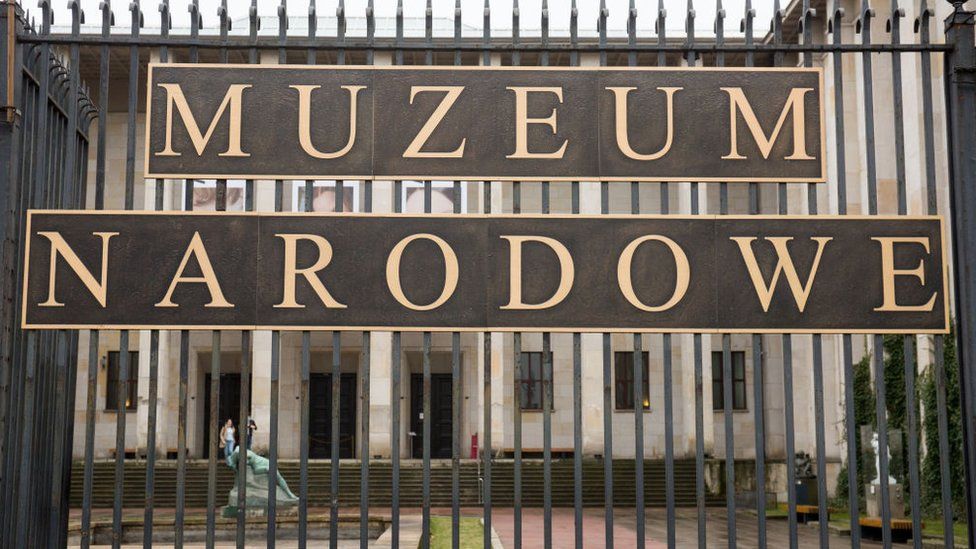ARTICLE AD BOX
 Image source, Getty Images
Image source, Getty Images
Poland's culture ministry said the Kandinsky was stolen from the national museum in Warsaw almost 40 years ago
By Adam Easton
BBC News, Warsaw
Polish authorities have condemned as scandalous a decision by a German auction house to sell a painting by Russian artist Wassily Kandinsky.
They allege the 1928 untitled abstract watercolour was stolen from Warsaw's National Museum in 1984.
The auctioneers said they had investigated information from Poland's culture ministry that the painting was stolen and concluded there was no legal objection to the auction.
The work sold for €310,000 (£265,000).
But Berlin's Grisebach auction house has now decided to suspend the finalisation of the sale following the angry response in Poland.
Officials in Warsaw say the Kandinsky painting has a stamp on its reverse side from the museum where it originally came from.
The Polish consul in Berlin, Marcin Krol, attended the auction in Berlin but was unable to prevent the sale of the artwork.
He said it had been included in an Interpol database of stolen works of art.
"The German auction house acted like a fence for stolen goods," Poland's deputy prime minister and culture minister, Piotr Glinski, wrote on Twitter. "It sold the Kandinsky despite knowing it was stolen from a Polish museum."
Image source, Grisebach auctioneers Berlin
Image caption,Kandinsky painted the untitled watercolour in 1928
The ministry said it would take legal steps to try to retrieve the painting, describing the auction as "highly unethical and contrary to the standards that should apply on the international art market".
In a statement, the auction house said it had taken "the greatest care" in checking the ownership of the Kandinsky watercolour and had come to the "clear conclusion that there were no legal objections to the auction".
However, it had decided to seek a court review and was suspending further handling of the sale until it received a binding clarification.
The sale of the Kandinsky is particularly sensitive because Poland is still trying to recover thousands of artworks looted by the Nazis during World War Two.
Deputy Foreign Minister Arkadiusz Mularczyk said the sale reflected a broader unwillingness on Germany's part to return stolen property to Poland.
"They don't want to return very important cultural property that they have stolen from Poland. The main problem for us is that German law protects this theft. It doesn't look good for the German rule of law," he told the BBC.
German law allowed for such sales because a work was no longer considered stolen after 30 years, he added.
"I see this situation as a bigger problem because we see the German government and Germany generally has a problem with compensation and stolen assets, cultural properties seized from Poland. Many of them are located now on German territory," he said.
Mr Mularczyk led a parliamentary commission that calculated Polish losses to Nazi Germany from 1939-45 at 6.22 trillion zloty (£1.1tn; $1.4tn). In October, the Polish government sent a diplomatic note to Berlin to request compensation.
The German government considers the issue of war reparations closed because of a 1953 agreement between the USSR and East Germany under which Poland's then communist authorities resigned from any further claims.
Poland argues that agreement is invalid because it was not independent from Soviet influence at the time.
You may also be interested in:
'Saint Philip Baptizing a Servant of Queen Kandaki' was stolen from a museum in Poland towards the end of World War II

 1 year ago
36
1 year ago
36








 English (US)
English (US)